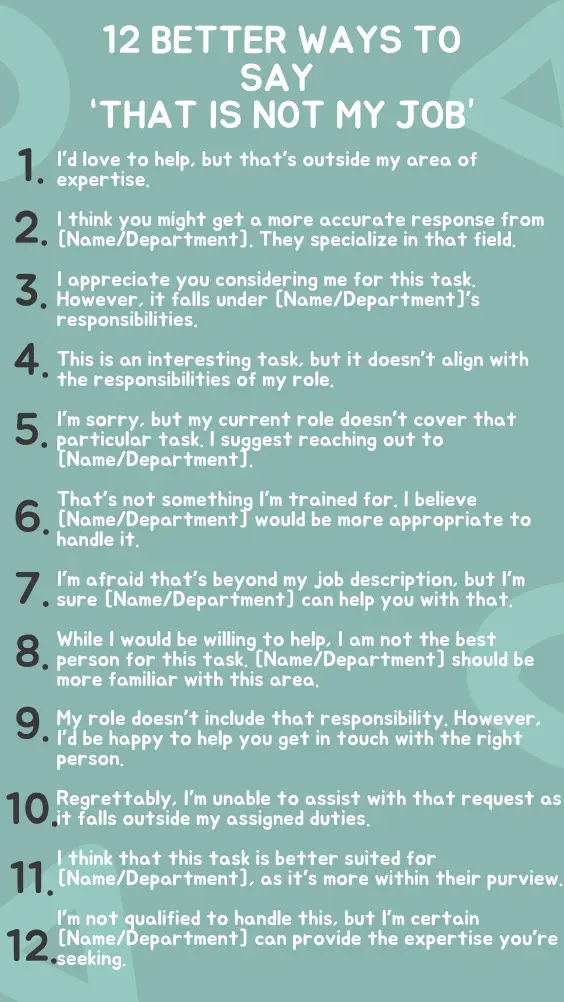There is no shame in turning down assignments when they are not your responsibility or you don’t have the expertise to complete them. More importantly, however, is what your approach will be—whether you will use the dismissive phrase “it’s not my job” or find a more professional and polite approach. So you won’t have to wonder what to write, we’ve provided you with 12 sample sentences to politely explain that it is not your job. Additionally, we’ve answered the most common questions related to the phrase “That is not my job”.
12 Better Ways to Say “That is Not My Job”
1. “I’d love to help, but that’s outside my area of expertise.”
With this phrase, you politely decline to take on the task at hand. You reply that you would be happy to help, but at the same time, you most politely decline to take it on.
2. “I think you might get a more accurate response from [Name/Department]. They specialize in that field.”
Here again, you are refusing to engage, but by saying it this way you are at the same time helping the other party by telling them who they can approach.
3. “I appreciate you considering me for this task. However, it falls under [Name/Department]’s responsibilities.”
Again, a very polite way to begin your denial is by communicating that you would be willing to take it on, but that you simply are not responsible for this type of task and should be referred to the responsible team. In addition to a team, you might write the name of the person who could help.
4. “This is an interesting task, but it doesn’t align with the responsibilities of my role.”
Here you are rather showing interest, but at the same time again refusing to do the task because your job description does not include this duty.
5. “I’m sorry, but my current role doesn’t cover that particular task. I suggest reaching out to [Name/Department].”
Here, you first apologize, and then communicate who the other party can contact.
6. “That’s not something I’m trained for. I believe [Name/Department] would be more appropriate to handle it.”
If you wish to use a different excuse, you can say that you are simply not trained for the task you are being given.
7. “I’m afraid that’s beyond my job description, but I’m sure [Name/Department] can help you with that.”
Another example of refusing to take the job because it’s not your responsibility.
8. “While I would be willing to help, I am not the best person for this task. [Name/Department] should be more familiar with this area.”
You might use this excuse when, for example, a customer asks you when they will receive the invoice but you work in sales.
9. “My role doesn’t include that responsibility. However, I’d be happy to help you get in touch with the right person.”
After an apology like that, it’s unlikely that anyone will be upset that you can’t help them.
10. “Regrettably, I’m unable to assist with that request as it falls outside my assigned duties.”
This is a rather formal and direct apology, but again, it’s polite at the same time.
11. “I think that this task is better suited for [Name/Department], as it’s more within their purview.”
This is another polite way to transfer a job to another department. For example, if a customer reports a technical problem to you, and you are handling the accounting for a company, you can tell him to contact the support department.
12. “I’m not qualified to handle this, but I’m certain [Name/Department] can provide the expertise you’re seeking.”
Of course, not everyone understands everything, and by using this sentence, the other party will surely understand you and won’t get angry if you don’t help them.

When to Say “That is Not My Job”?
To say the phrase “it’s not my job” is not very appropriate in general, because you are appointed to help with whatever you can. But sometimes there are cases where you have no other choice and you just have to say that what they ask of you is not your job. Here are a few examples:
1. Out of Your Skill Set – When someone forces something out of you that you don’t understand and aren’t an expert in. Most large companies have departments that specialize in a particular area, such as Human Resources, Sales, Finance, etc. For example, a finance person will understand much more about invoice issues than a salesperson.
2. Overloaded with Work – Sometimes, it is better to tell someone that you have a lot of work to do and decline the extra work, rather than taking it all on and making the other person wait.
3. Boundary Violation – If somebody keeps shifting their duty onto you without permission, it is best to make it clear where your job description starts and ends. Defining these boundaries will help protect you from any further intrusions.
Will I Get Fired if I Say “That is Not My Job”?
It’s not pleasant to use that phrase on the job because when you were hired, you were sometimes expected to take on duties that exceeded your skill set.
However, if you frequently turn down assignments and say they are not your responsibility, it will start to look suspicious to your management. It will appear that you are not a team player, uncooperative, and unwilling to contribute to the company’s success. In this case, you will jeopardize your job and may be fired.
However, if you approach the situation tactfully and act professionally, you have nothing to worry about. Instead of saying “It’s not my job”/”I don’t care“, use one of the 12 phrases above or more cooperative language.
Remember that every company has its own approach; if you’re unsure of how to act, it is always better to ask your Manager or HR department.
Should I Tell My Manager if a Colleague Assigns Me Work Outside of My Duties?
Yes, it would be best to discuss it with your manager, especially if you can’t perform your personal tasks that way. Here are some steps to follow:
1. Speak with Your Colleague First – Before you start a conversation with your manager, speak with your colleague first. Be courteous and approach in a friendly manner.
2. Document Everything – keep any chats or emails when you are made to do tasks outside your job description.
3. Request a Meeting with Your Manager – if a colleague continues to give you assignments after you have already spoken to them make an appointment with your manager. Behave professionally and show the records.
Can I Complain to HR if My Manager Assigns Me Work Outside of My Job Responsibilities?
Yes, you can contact the HR department, but before you do that you may want to review your Job Responsibilities first, there may be something you missed. Discuss the matter with your manager first, they may not have realized they were overwhelming you with extra work.









